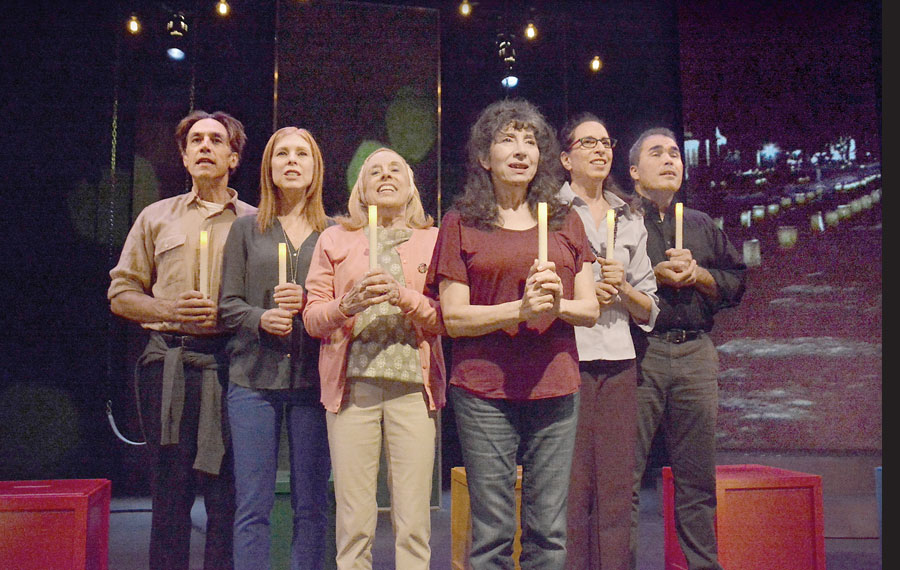 George Villas, Jennifer Lee Laks, Michele Schultz, Jean Kauffman, Roslyn Cohn and
Joe Lorenzo in “26 Pebbles.”
(Photo by Ed Krieger)
George Villas, Jennifer Lee Laks, Michele Schultz, Jean Kauffman, Roslyn Cohn and
Joe Lorenzo in “26 Pebbles.”
(Photo by Ed Krieger) On Dec. 14, 2012, 20-year-old Adam Lanza entered Sandy Hook Elementary School in Newtown, Conn., with a rifle and a handgun and fatally shot and killed 20 children and six adults before killing himself. The story of how the community coped with and came together after this unspeakable tragedy plays out in playwright Eric Ulloa’s “26 Pebbles,” based on actual interviews with Newtown residents.
Set six months after the massacre, the play unfolds in a classroom with six actors playing multiple roles. The seats are colored blocks and swings, and video projection images set the scenes. The characters’ devastating testimonies illustrate how life in their quiet, lovely New England town was shattered in an instant, and how they slowly came to heal as families and as a community.
“Eric purposely concentrated on the aftermath — how people dealt with it and healed from it,” director Jules Aaron told the Journal. “It’s ultimately very uplifting, and that’s what drew me to the play.”
“[The play] reminds me to be more patient and forgiving,” actor George Villas said. Aaron said, “My threshold for understanding and tapping into my compassion is something that these characters have helped me with. I can’t remember a cast becoming this close and connecting to each other this much, and that’s because of the material. They do a prayer circle every night before they go on.”
Each performer seamlessly morphs into their characters, using changes in voice, posture, gestures, accessories and hairstyles to make the distinction between them. At first, Aaron needed a flow chart to wrangle them all. “Eric eliminated two female characters in the last rewrite, thank God,” he said.
“I take credit for some things but the actors did a lot, too,” the director continued. “It was a highly documented event and they did reams of research. These are real people, but I told them they had to make the characters their own.”
Donning a yarmulke and with a sweater draped around his shoulders, Villas plays Rabbi Shaul Praver of Newtown’s Temple Adath Israel. In one of several moving speeches, he says, “Newtown doesn’t want to be remembered as the town of tragedy. We want to be remembered as a bridge to a new and kinder world. … It’s about the red blood that flows out of all of our veins. It’s about the clear tears that flow out of our eyes. We are all the same.”
Villas said he experiences “a period of decompression you have to go through afterward because there’s so much emotion you have to tap into. It’s draining because it requires so much emotional investment. But these kinds of stories need to be told to hopefully serve as a reminder that the world needs to change.”
Sandy Hook, sadly, was not an isolated incident. “The gun laws in our country are ludicrous and flagrantly inappropriate for what is happening on the streets. This is just one example of dozens and dozens,” Aaron said. “The play has something really important to say, especially in times like these.”
As a gun control advocate, actress Jean Kauffman was eager to be a part of the play. “We are all one moment away from it happening to us. We are all vulnerable,” she said. But she emphasized that the play’s theme is about a community coping and coming together, not social politics. “It lets the audience come to their own conclusions. There are no easy answers.”
“Newtown doesn’t want to be remembered as the town of tragedy. We want to be remembered as a bridge to a new and kinder world. It’s about the clear tears that flow out of our eyes. We are all the same.”
— George Vilas as Rabbi Praver
A self-described “High Holiday Jew” who recently attended services at Adat Ari El in Valley Village, Kauffman is one of three Jewish actresses in the play. Both she and Aaron spoke of the play’s connection to the concept of tikkun olam.
“As a Jewish man, I find a real connection to that and to how we take care of our own,” Aaron said. “With the show coming in the middle of the holidays, we didn’t plan it that way but it’s kind of fitting.” While he has experienced a lot of loss resulting from illness, he has not been touched personally by gun violence. “But, boy, am I aware of it,” Aaron said. “I’m not connected with a congregation, but I pray every night for friends and for things to change.”
Kauffman hopes that theatergoers will take away “how important it is to love one another, to support people who need it, that we do need more gun control and that we need to address the issue of people who are mentally ill.”
“We talk about healing and adjusting and reconnecting after a horrific tragedy and finding connection and love and forgiveness,” Villas said. “You hope the audience connects and something triggers them emotionally. Art does that when it’s good. This is one of those experiences, and as an artist I get to experience that rare thing that happens every so often. I hope that people will come to the play and see that for themselves.”
“26 Pebbles” runs at the Reuben Cordova Theatre at Beverly Hills High School through Oct. 15. Tickets, $38. theatre40.org.




















 More news and opinions than at a Shabbat dinner, right in your inbox.
More news and opinions than at a Shabbat dinner, right in your inbox.